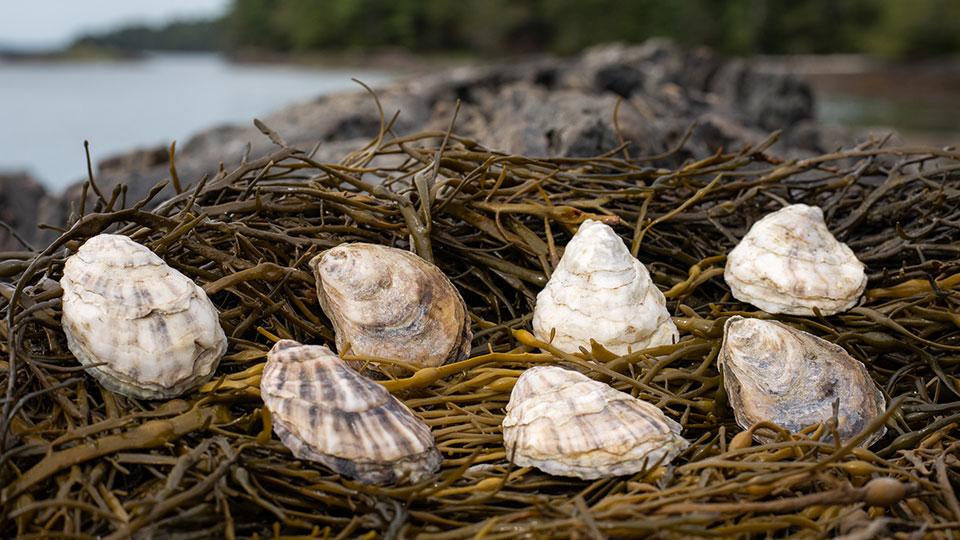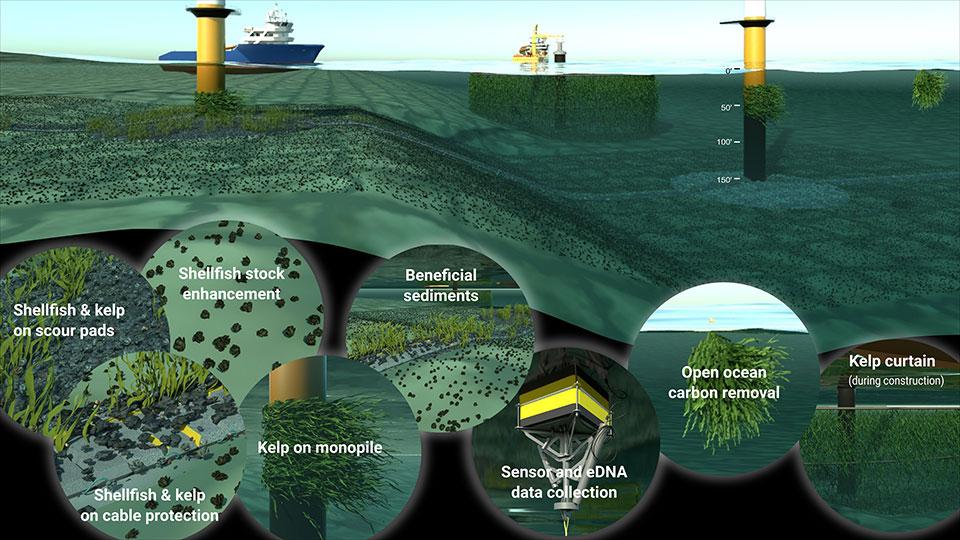Nature-Based Solutions for Offshore Wind: A Proactive Approach to Sustainability
Discussing the case for nature-based solutions for offshore wind projects
Tetra Tech and Running Tide discuss how a leading with nature approach can help offshore wind clients to make a positive impact on ocean health and can support regional and corporate sustainability goals.
Tetra Tech’s sustainability and nature-based solutions experts Rachel Bigby and Jason Coccia and co-author Adam Baske, Running Tide’s director of aquaculture and restoration, discuss the case for nature-based solutions for offshore wind projects.
Leading with nature
Carbon has led the sustainability conversation for many years now, though a focus on nature is swiftly gaining momentum globally. The business case for focusing on leading with nature to manage risks and opportunities and realize measurable impact with a wealth of co-benefits is becoming clearer. The creation of the Taskforce on Nature-related Financial Disclosures (TNFD) and the focused effort to build global standards around enhanced management of natural capital assets—in addition to carbon management—are quickly rising as priorities. A sustainability strategy with an amplified focus on biodiversity and nature-based solutions demonstrates an organization’s ESG maturity, as well as its ability to adapt and build resiliency to climate and nature-related challenges, with both people and planet in mind. At Tetra Tech, we’re supporting our clients across the globe by leveraging our science and engineering expertise to design bespoke solutions for their unique sustainability challenges and opportunities.
The science is clear
In today’s environment, habitat degradation and biodiversity loss are most starkly visible among coral reefs in the tropics. More temperate regions are just as vulnerable, if not more so, to climate impacts, wide-scale development, and increasing demands on wild fisheries. In the northeastern United States, fish distribution patterns, natural recruitment variability, and climate change pressures may all work to constrain the productivity of many marine resources and the people who rely on them.
“The science and funding are clear—nature-based solutions offer a mechanism to proactively manage risks and achieve climate targets.”
The latest report from the United Nations Intergovernmental Panel on Climate Change (IPCC) clearly outlines several well-known impacts of anthropogenic activity across global oceans. Some leading governments see potential in using nature-based solutions to reverse these human-caused effects. Solutions that protect, sustainably manage, and restore modified ecosystems must be inspired and supported by nature so that they are resilient, adaptable, and cost-effective. Such solutions simultaneously provide environmental, social, and economic benefits to stakeholders.
Nature-based solutions enhance ecosystems and improve sustainability outcomes for offshore wind
In partnership with ocean health company Running Tide, Tetra Tech is supporting the deployment of innovative nature-based solutions for our offshore wind clients at speed and scale. These interventions use technology, engineering, data, and real-time monitoring to provide a measurable, positive impact to oceanic and coastal ecosystems. They also improve coordination and collaboration among ocean-based operators and stakeholders. One example of a solution we offer is shellfish, seagrass, and/or macroalgae planting for scour protection and surrounding cable-crossing areas, providing habitat enhancement and biodiversity benefits. The solution also helps developers meet project-level mitigation requirements and their corporate sustainability goals.
Tetra Tech brings decades of experience supporting clients to meet their restoration and biodiversity goals. As an example, Tetra Tech supported the Coastal Protection and Restoration Authority of Louisiana on its Living Shoreline Demonstration Project to evaluate products to establish a living shoreline along 21 miles of coastal fringe marsh in the Gulf of Mexico. The project resulted in enhanced coastal resiliency to wind-wave action, stimulated oyster growth, increased biodiversity in the area, and obtained permits on schedule to complete project construction within the grant funding period.
Leveraging our suite of Tetra Tech Delta technologies, we provide our clients with coastal and climate change modeling, artificial intelligence, GIS, and remote sensing to simulate the impact of a changing climate on our environment. Our holistic approach to using technological, biological, and engineered solutions enables us to support our clients from project design through implementation.
Running Tide designs and implements nature-based interventions that rebalance Earth’s carbon cycle, decarbonize global supply chains, restore marine ecosystems, and revitalize coastal communities. Running Tide’s fleet of mobile shellfish nursery systems automate production of multiple bivalve species and are capable of providing commercial and ecosystem service value to nearshore and offshore areas. This solution requires a fraction of the space, labor, and materials of conventional farming. These systems use state-of-the-art technology, including machine vision and automated sorting systems, for constant monitoring and adaptation. Running Tide also cultures a range of macroalgae that offer significant ecological value and encourage enhanced biodiversity and ecosystem resilience, as well as deploys a multi-pathway system for carbon removal.
Together, Tetra Tech and Running Tide are supporting our clients to move beyond carbon and take a leading with nature approach to improve ecosystem health, manage climate risks, and realize measurable operational and community-wide impacts.
Global funding for nature-based solutions is growing rapidly
As the deadline to meet Paris Agreement targets approaches, private and government funding has grown rapidly. The Council of the European Union (EU) recently endorsed a new EU strategy on adaptation to climate change, calling for more nature-based solutions to help build resilience to climate change and enhance biodiversity. The Council backed this up by pledging an increase in spending for biodiversity in the Multiannual Financial Framework to 10 percent in 2026.
In the United States, the Infrastructure Investment and Jobs Act has dedicated $47 billion for climate resiliency projects, including nature-based infrastructure. At COP27, the Biden administration released the first strategy of its kind, the Nature-Based Solutions Roadmap, to scale up solutions to address habitat loss and climate change.
“Together, Tetra Tech and Running Tide are supporting our clients to move beyond carbon and take a leading with nature approach to improve ecosystem health, manage climate risks, and realize measurable operational and community-wide impacts.”
The science and funding are clear—nature-based solutions offer a mechanism to proactively manage risks and achieve climate targets.
Early movers can frame future standards
Integrating nature-inclusive design in the early stages of offshore wind development provides an opportunity for developers to build holistic projects that support positive economic, environmental, and social impacts. Early movers can set precedent for nature-based solutions standards for offshore wind and establish themselves as leaders in sustainability.
Tetra Tech’s and Running Tide’s solutions will help our clients proactively meet key business and regulatory sustainability objectives, including net-zero commitments, climate mitigation, resiliency, and nature-positive targets that enhance the value and impact of offshore wind projects.
Rachel Bigby is an ESG and sustainability manager with Tetra Tech. She brings 12 years of experience as a corporate social responsibility professional working in sustainability and social impact across the private, public, and nonprofit sectors. As a program and project manager, she supports commercial and government clients to manage climate risks and opportunities to advance their sustainability maturity. She has extensive experience doing materiality assessments and stakeholder engagement, crafting ESG and social impact policies, and designing bespoke sustainability strategies and programs to aid clients in their unique sustainability journey. She earned her Master of Arts in Sustainable Development from the School for International Training and has certificates in Corporate Social Responsibility, Greenhouse Gas Accounting, and Permaculture Design.
Jason Coccia, Tetra Tech’s director for sustainability and nature-based solutions, helps clients achieve sustainability goals while managing risk tied to climate change and biodiversity loss. He focuses on developing comprehensive solutions that meet adaptation, resiliency, and mitigation needs while enhancing co-benefits of ecosystem services and human well-being. He represents Tetra Tech on the international Taskforce for Nature-related Financial Disclosures (TNFD) Forum and is professionally certified by the IUCN on its nature-based solutions standard. He has helped Fortune 500 companies implement carbon sequestration projects and other resource mitigation through large-scale ecosystem restoration. An actively licensed certified public accountant, he holds a Master of Business Administration in Sustainable Enterprise and Master of Environmental Management in Resource Ecology.



